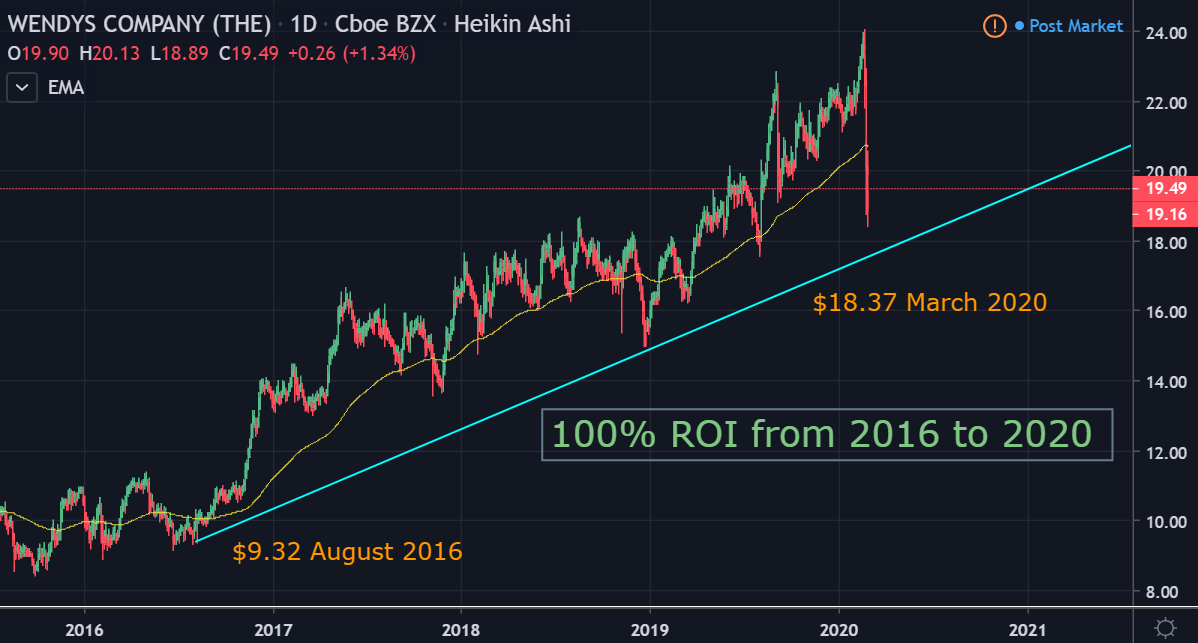Modern Markets Episode 3: Decentralized Finance, and Wendy's eats Mcdonalds Lunch
March 8th, 2020, by FomoHunt

This week saw the coronavirus continue to dominate headlines and cause more uncertainty in the international markets. The response from the business community has been varied, from companies suggesting people work from home to scrambling to put new policies in place. Regardless of how your workplace has decided to address the issue, our suggestion is to practice good hygiene, as we discussed in last week's newsletter.

This newsletter is incorporated into the Weekly Modern Markets Podcast available on iTunes, Spotify, Anchor, and Stitcher.
Round the World in Markets
North America
After an initial recovery by stocks earlier in the week, they tumbled quickly after. On Tuesday the Fed cut the interest rate in its first unscheduled cut since 2008, targeting a 1%-1.25% interest rate.

Analyst and founder of QE Trader, @MatiGreenspan, is concerned about this recent move. “The answer seems to be we reduce interest rates and print more money . . . that’s their playbook.” Mati explained that the market’s reaction to the announcement was a disappointment, the 0.5% Emergency Rate Cut. Normally rate cuts are done slowly over time, to allow the markets to adjust accordingly.
“In this case, the timing was extremely off . . . Instead, they jumped the gun and did something completely unorthodox. They did this rate cut at a time when they weren’t supposed to have any meeting, they weren’t supposed to have any interest rate decision.”
Other financial institutions expressed a similar lack of enthusiasm. Goldman Sachs is projecting a GDP increase of 0.9% in Q1 of 2020. President Trump had previously forecasted growth of 3%.
South America
Mercado Libre, the Argentinian Amazon rival, plans to invest $420 million in 2020. The online retailer will be focusing its attention on Mexico, expanding supply lines, logistics, and customer awareness. While largely unknown in the US, Mercado Libre has a substantial foothold in Brazil, Argentina, and Mexico.
In 2018 Mexico has a GDP growth of 2.2%, higher than Canada’s growth of 2.1%.
European Union
Tourism to Europe has ground to a halt, dropping 79% compared to the previous year, following the outbreak of the coronavirus in the region. The Wall Street Journal is reporting that “thousands of people have canceled their trip to the region . . .” Spring and Summer travel are normally peak times for travel to the EU to visit the cities and museums. The Louvre, home to the Mona Lisa, is reporting record-low attendance.
Despite being sold as large posters, the actual Mona Lisa is actually a very small painting, measuring 30x20 inches.
Asia
Coronavirus Reduces Chinese Air Pollution

Images from several pollution monitoring satellites from NASA show a marked decrease in the air pollution surrounding China’s Wuhan region. As CNBC reports, “Typically, there are lower levels of NO2 in China around this time of year, as many businesses and factories close for the country’s Lunar New Year celebrations.”
While it is normal to see a dip in air pollution as businesses shut down for the Lunar New Year, the coronavirus, and resulting factories closing, has cleaned up the smog and air pollution for an extended period of time.
India Retracts Cryptocurrency Ban
A ban on banks and financial institutions participating in “any service in relation to virtual currencies” was overturned on Tuesday by India’s Supreme Court. While this is a step in the right direction towards adoption, there is still a lack of infrastructure to onboard the majority of the Indian population.
India has an interesting history in setting monetary policy for its population. In 2016 it banned large bills of 500 and 1,000 rupee denominations, worth approximately $6.80 and $13.60 respectively. This created a run on ATM’s as the nation rushed to adjust to smaller bills.
South Korea to Regulate Cryptos
The day after reversed its decision on its crypto ban, South Korea passed a bill to allow regulation of cryptos and exchanges. This would allow for regulated exchanges and policies to be implemented on a national scale. Previously, both the cities of Seoul and Busan had led initiatives to create municipal cryptocurrencies specific to their cities.
Middle East
Oil and Gas appetite to return post-coronavirus
The head of Saudi Aramco’s trading division is optimistic about the demand for Oil and Gas returning post-coronavirus. In a statement with Arabian Business in London, he commented that the end of April should see a reduction of fear in the global markets.
Fast Food Breakfasts - Wendy’s To Eat McDonald’s Lunch

(Image)
On Monday, the fast-food restaurant Wendy’s announced a nationwide rollout of its new breakfast menu. Previously limited to select markets, this push will let Wendy’s compete with franchises like McDonald’s and Burger King, as they all scramble for a piece of the proverbial pie. Although for Wendy’s this pie is now a Breakfast Baconator or Maple Bacon Chicken Croissant.
McDonald’s responded by announcing that 3/2/2020, the same day as Wendy’s rollout, as Free Egg McMuffin day. The franchise gave out Egg McMuffins to hungry restaurant patrons. Wendy's Twitter account (always good for a laugh) was less than encouraging.

(Courtesy of Twitter:)
Wendy’s originally announced the breakfast relaunch in September 2019 which caused a correction in the stock. Despite this, and the coronavirus distress, the stock has done well for investors. Since 2016 it has more than doubled in price, employee hygiene aside.

In the US, more than 33% of adults eat at a fast-food restaurant every day, and breakfast items accounted for 16% of total revenue in 2019. Since the 1970’s fast-food restaurants have increased revenue from $6 billion to $200+ billion. However, the recent coronavirus may have an immediate impact on traffic these establishments receive due to fears of infection risks. We may see an increase in restaurants publicly implement disinfectant protocols to calm the public’s nerves.
Health Implications
While convenient for people on the move, fast-food has long had a negative public perception, being closely associated with obesity rates in the US and internationally. High amounts of salt, corn syrup, and soybean oil are present in most of the items served in these restaurants. Health officials are unanimous in their agreement that these ingredients are not beneficial when eaten in large quantities.
The cost of obesity has long been a looming issue in America, with an increase in reported cases of 12% over the last eighteen years. Despite this impending health crisis, several companies have taken a page from former White House Chief of Staff Rahm Emanual’s phrase “Never let a serious crisis go to waste.” The following corporations and ETFs have chosen to capitalize on the situation, either by supporting obesity rates or combatting it.
% changes are over 1 year
YUM - Owns Taco Bell, Pizza Hut, and KFC -0.54%
MCD - McDonald’s +14.64%
WEN - Wendy’s +16.03%
SLIM ETF - Focuses on biotech, pharmaceuticals, and other industries directly tied to obesity +16.81%
Why an Article on Breakfast?
While Wendy's breakfast announcement may not seem like the most germane topic, considering the spread of the coronavirus, it does allow us to take a closer look at the fast-food industry. Inspecting human behavior and how it relates to financial markets is sometimes overlooked when predicting market reactions. Wendy’s breakfast push may be an attempt to bring in customers that might otherwise avoid public gathering places because of the virus. It could also be that Wendy’s has decided to move forward despite the public’s growing panic around the disease.
DeFi - The Biggest Trend You Never Heard About

(Image)
Decentralized Financed, DeFi, is the new buzzword within the blockchain industry. In short, it seeks to replace every centralized banking service with a decentralized version. Checking accounts, loans, custodial services, and payment networks are all candidates for this new ecosystem. While normal services rely on the central authority of a bank, Decentralized Finance aims to do away with all gate-keeping third parties and switch to a peer-to-peer system.
In the current loan system, a bank looks at a candidate and makes a decision based on criteria. Specific qualifications determine the size and terms of the loan before it is ultimately approved by a person. Name, ID, Social Security Number, and other personal information are collected before the approval. Collateral may be required to help secure the loan. Loan terms are also determined by the use of the loan, i.e. different interest rates for a mortgage vs. a personal loan.
For a Decentralized Finance scenario, a specific amount of cryptocurrency is required to secure the loan. The loan is then issued in a stablecoin tied to the value of a dollar. That’s it. Because these systems operate on smart contracts no ID or personal information is required other than the cryptocurrency address. There is no loan officer to approve the loan or ask questions as to its intended use.
What’s a Smart Contract?

(Image)
Smart Contracts are one of the foundations of Decentralized Finance. These are computer programs that facilitate or enforce a digital contract. Smart contracts differentiate themselves from normal computer code is that they benefit by being secured and validated by the blockchain, which includes a massive amount of computers around the world. This means that thousands of computers are witnessing the contract playing out, and enforcing its rules.
The easiest way to explain smart contracts is to imagine a hangry office worker. At 3 PM Alice needs a sugar rush, fixable by her favorite sweet snack. Alice runs over to the nearest convenience store and picks up a Snickers. She pays the cashier (the third party) and is no longer hangry.
This purchase required 2 people and 1 product.
Alternatively, Alice could find a vending machine in her office. She puts money in the machine and gets a comparable Snickers. Because the vending machine is designed to accept a specific input (money) and deliver a specific output (Snickers) no cashier is needed. And it conveniently cuts out awkward small talk about the weather or impending coronavirus.
This purchase required 1 person and 1 product.
While the vending machine is a VERY simplistic explanation, this is the promise of smart contracts: making transactions easier and faster, while eliminating the third party.
Is This Related to Bitcoin?
While DeFi shares many similarities with Bitcoin, DeFi is a much broader idea. Bitcoin is one coin/payment platform, while DeFi can involve multiple cryptocurrencies stretching across a variety of systems. In fact, most DeFi systems operate on the Ethereum blockchain instead of Bitcoin.
Ethereum?
Ethereum is a cryptocurrency that is easier to program than Bitcoin. Most decentralized finance platforms are built on top of Ethereum. Dappradar shows that 9 of the top 10 decentralized applications in the world currently operate on Ethereum.
Bitcoin and Ethereum are both “programmable money,” but Ethereum is more flexible in what it is able to do, allowing programs to be built on top of its existing blockchain. Building on top of existing protocols is common in the technology world, Youtube is built on top of several existing internet programs and protocols. And it delivers cat videos to billions of people.
So What Can I Do Again?
The flexibility of DeFi allows it to replace many of the current banking functions. At the time of publication, loans and interest-generating accounts are the most popular services offered. In the future, we will see additional services added as the demand for decentralized banking services increases.
How Do I Make Money with DeFi?
Ah yes, the all-important question. The good news is that several DeFi platforms allow users to generate income based on their deposits, much like a CD or savings account.
(Credit to Anthony Pompliano)


Here are some recent interest rates from popular platforms that just happen to be exponentially higher than what brick-and-mortar banks are offering.
Celsius 12.3%, paid out in USDT stablecoin
Fulcrum 9.54%, paid out in DAI stablecoin
BlockFi 8.6%, paid out in GUSD stablecoin
Crypto 8% BTC, paid out in Bitcoin
For the Celsius platform the requirements are simple: create and verify an account on their app, then send cryptocurrency to the app. Interest begins immediately upon deposit. A useful interest rate calculator to calculate payouts can be found here.
While earning interest anonymously may be the dream of many (this author included), many DeFi lending platforms still require some form of identification to satisfy international banking regulations.
This Sounds Made Up and Weird
Trust me, I know. Many new things sound insane and outlandish when first presented. But this novelty does not mean the idea is without merit. At one point in time, the internet was a new and crazy idea. NBC famously had to ask a cameraman on air to explain the internet in 1994.
DeFi certainly seems like nerds lending out magic internet money, and then making more internet nerd money. As futuristic and complicated as it sounds, there is real money and usage behind these programs. Celsius recently doubled the total amount of crypto payments from its platform since November. That’s $11 million in interest paid to over 75,000 total users. Not bad. (Image)
At the time of writing, there is over $1 billion locked up in DeFi smart contracts over the world. These funds represent confidence that users have in the security and returns of the system.
As the internet continues to connect more people around the world the globe seems to get smaller. While previously relegated to brick and mortar offices, many banks offer online banking alternatives. Some “high interest” checking accounts are online-only, though no one is getting excited over a 1.00% interest rate. Blockchain technology has proven itself over the 11 years of its existence. The decentralization of banking solutions through DeFi is just getting started, but is clearly not a fad.
This newsletter, analysis, research, and commentary provided by Modern Markets, lead analyst Kaltoro, with contributions from TytanInc and Digital Lawrence. The publication incorporates data from numerous sources including, but not limited to, CoinMarketCap, Bloomberg, CNBC, Lunar Crush, and the team at FomoHunt.




